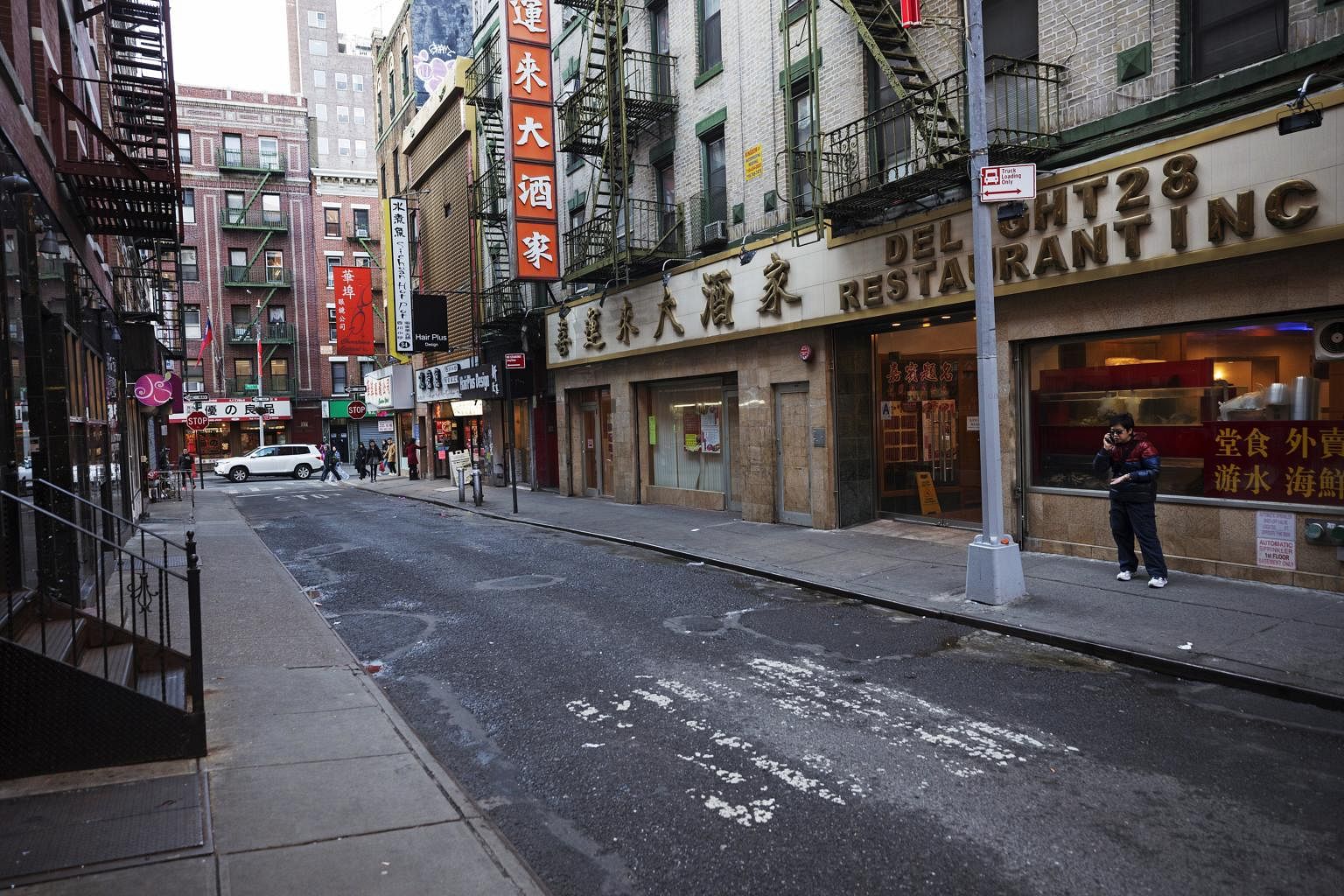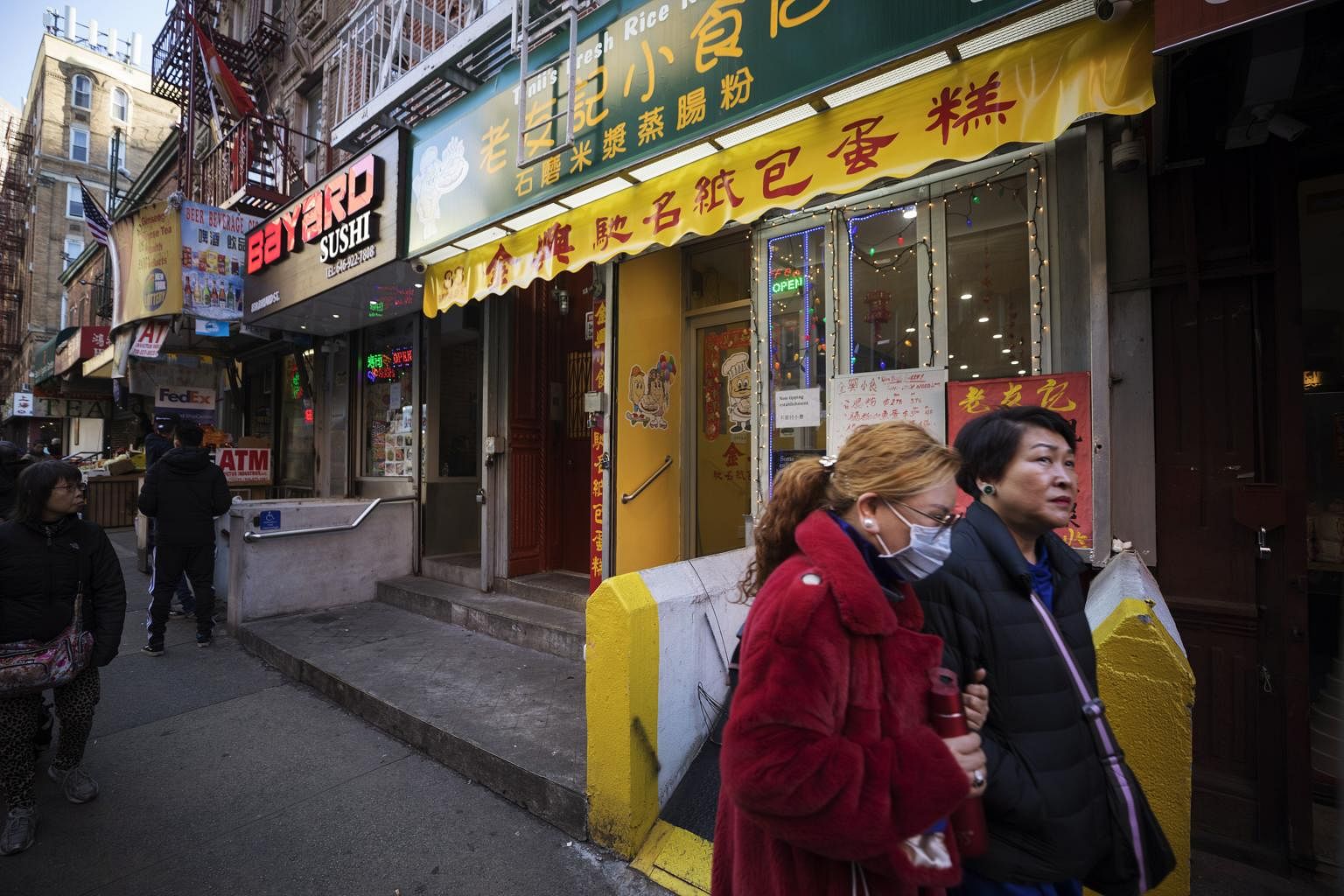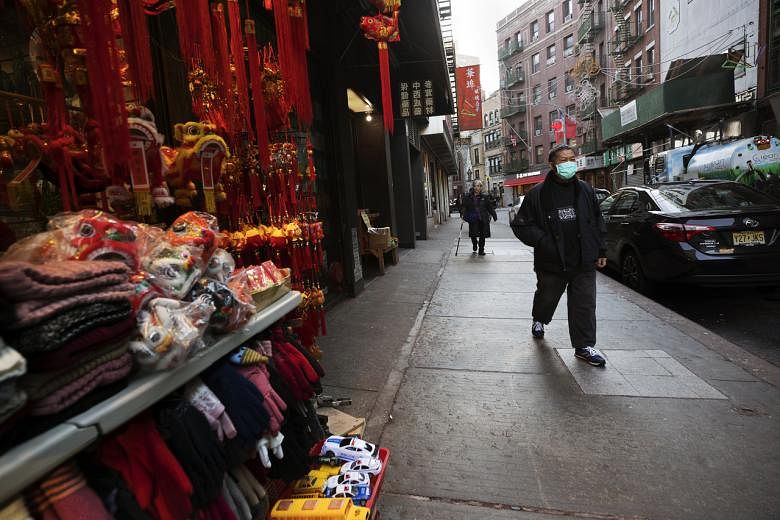NEW YORK (NYTIMES) - The manager of a hotel near Newark Liberty International Airport in New Jersey that relies on tourists from China estimated the loss from the coronavirus outbreak at "well over US$100,000 (S$138,000) and climbing".
A company that arranges Chinese-language bus tours of the sights in Manhattan is dealing with as many as 300 cancellations from Chinese tourists who cannot come to New York this week.
The owner of a travel agency in Queens who had booked trips for 200 Chinese tourists this week and next has already thought about when he might have to lay off two of his five employees.
With health officials scrambling to deal with an outbreak that is spreading around the world, tour operators and travel agents in the New York area are bracing for the economic pain that will come with empty rooms in hotels and empty seats on tour buses.
"It's going to be a serious financial burden," said Ms Elizabeth Chin, a travel agent in Fort Lee, New Jersey, and chairman of the Pacific Asia Travel Association, a trade group.
"The flights are cancelled. The tour operators have cancelled."
Across the globe, many cities are starting to experience the fallout from the precipitous drop in visitors from China now that the Chinese government has imposed a ban on organised tours and many airlines have suspended service to and from that country. The coronavirus is believed to have originated in Wuhan, China, late last year.
In London, restaurant operators in the city's Chinatown have noticed a steep drop in business since the country's first two cases of the coronavirus were confirmed last week in north-east England.
"Compared to the last few months, we lost around 50 per cent of our customers," said Mr Martin Ma, general manager of Jinli, a restaurant with two branches in London's Chinatown. "The reason is the virus."
Health officials in New York have identified three possible cases of the virus among residents, all of whom are now hospitalised. The official said the city was prepared for the possible spread of the virus and cautioned people not to panic.
Still, beyond a plunge in Chinese visitors, owners of restaurants and stores in New York's three main Chinatowns say the coronavirus and the fears it has stoked are hurting business.

At restaurants in Chinatown in Manhattan, workers and owners said business had dropped 50 per cent to 70 per cent in the last 10 days.
In New York City, China is an important source of visitors. Chinese tourists represent the second-largest group of foreign travellers. Visitors from Britain are No. 1
Mr Bruce Zhu, manager of China Tour Travel Services in Flushing, Queens, had booked hotel rooms and made sightseeing-tour arrangements for 200 people who were scheduled to arrive from China in the next two weeks. He said that was a typical number for early to mid-February.
"It's a big problem," he said. "We have to cancel the bookings, cancel the hotels. We lose a lot of money on the bookings."
He said he might have to lay off two of his five employees - the two who work in the office full time. The other three work from home as needed, he said.
He said he would decide whether to cut back in about a month. "If there's good news, they'll continue," he said. "If the news is no good, not."
Mr Don Chan, manager at a company that schedules Chinese-language tours, said that after the coronavirus outbreak became known but before travel restrictions took effect, the number of customers on each bus had been about half what it was a year ago - 10 to 20 customers a day, compared with 30 to 40 a day last year.
Now, he said, he has 15 tour guides who know that fewer passengers will mean less wrangling on and off the buses, but also less in tips.
He said that February and March are slow times and that he was looking ahead to what he called the "hot season", beginning in April.
"If this continues into April," he said, referring to the travel restrictions and the lack of tourists from China, "then we would have a problem".
Outside the office of Universal Vision in Flushing, which books tours of Manhattan as well as places like Niagara Falls, brochures promised "tours every day". But employees said there was no one to fill the seats on the company's minivans and buses.
One employee said on Monday that the company had handled cancellations for 200 to 300 customers for this week and at least as many cancellations for the weeks ahead.
Another travel agent in Flushing, Mr Lijun Yang, said his company would typically arrange for one tour bus a day to Manhattan. He said five or six buses from operators that cater to Chinese tourists usually pick up tourists on the way to Manhattan and sometimes converge at the same places.
"If you stand at the bull on Wall Street," he said, referring to the Charging Bull statue in Bowling Green, "you could see, through the course of the day, three or four of groups people arriving at the same time, 100 to 150 people."
"It's all stopped - zero," he said. "No Times Square, no Empire State Building, no Metropolitan Museum, no Wall Street, no United Nations."
Hotels near Mr Yang's office are also feeling the pinch. More than half of the 160 guest rooms at the John Hotel in Flushing were empty over the weekend, said the clerk at the front desk, Ms Amy Ong.

Around the corner, the manager of the Best Western Queens Court said cancellations and no-shows had begun before travel restrictions took effect, reducing business 25 per cent in the last two weeks of January.
A hotel popular with Chinese tour operators and travel agents, the Wyndham Garden Newark Airport, is likely to lose US$250,000 to US$300,000 worth of business in the next 90 days, said the general manager, Mr Dwayne Cronce. He said he was already facing a loss of well over US$100,000 from cancellations and no-shows.
"It hurt us immensely in the last three weeks, and it's probably foreseen to be that way for the next couple of months," he said. "Like everything else, it will work itself out, but the initial impact? Very difficult."
Prof Sean F. Hennessey, an assistant professor at New York University who follows the travel industry, said the economic effect was likely to be greater than during the Sars outbreak in 2002 because China accounted for less than 2 per cent of the city's foreign visitors then.
In 2018, according to figures from NYC & Co, the city's convention and visitors bureau, just under 8 per cent of the foreign travellers who visited New York came from China.
"New York will feel it," Prof Hennessey said, referring to the effect of the coronavirus, "because not only have Chinese travellers become an increasingly large portion of the visitor base, but they are one of the most profitable portions of the visitor base, not just for hotels but for the city as a whole. They stay longer, and they tend to spend more money."
The number of Chinese visiting New York has surged since 2008, when officials from the United States and China cleared the way for vacationers to visit.
Still, the 1.08 million Chinese who travelled to New York in 2018 represented only 1.6 per cent of the city's 65 million tourists that year, the most recent for which NYC & Co has figures. The vast majority of travellers to New York, some 51.5 million, were Americans from beyond the New York region.
"We're in a wait-and-see mode," said Mr Christopher Heywood, a spokesman for NYC & Co. "Obviously, there is concern."
For now, restaurants and stores in Chinatown in Manhattan are seeing a free fall in customers and foot traffic.
"For me going shopping, to see the community on the streets of Chinatown, I could tell," said Ms Joanna C. Lee, who with her husband, Mr Ken Smith, publishes the Pocket Chinese Almanac.
"What I would call the number of tourists, the non-Chinese people running around, they're much less. Whether we're talking about the usual injection of tourism money for the new year, I don't know."











